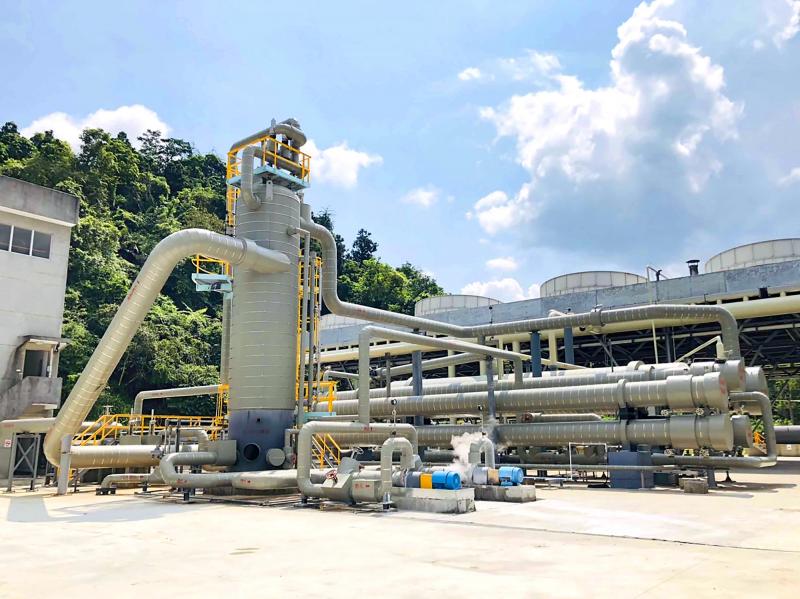The Cingshuei Geothermal Power Plant, the first privately built geothermal plant in Taiwan, is set to obtain a commercial license by the end of this month.
The 4.2 megawatt (MW) plant in Yilan County would generate enough electricity to power 10,000 households and has potential for expansion to further utilize the area’s geothermal resources.
Yilan has long been recognized as having the greatest potential for geothermal energy generation in Taiwan, with hot springs in the area bubbling so hot that tourists boil eggs in them.

Photo courtesy of Yilan County Government via CNA
State-run Taiwan Power Co (台電) has since the 1980s sponsored a 3MW plant in Cingshuei, but the project ran into trouble due to corrosion and silt blockage, and was eventually abandoned.
The current project, developed by Fabulous Power Co (結元能源開發), imported equipment from Nevada-based Ormat Technologies Inc.
The plant extracts water with temperatures of up to 180°C from 1,200m to 2,100m underground and runs it through a heat exchanger to generate electricity, before pumping it back into the ground again.
“The plant takes the heat, but not the water,” the Yilan County Government said in a press release.
Fabulous Power won the right to use the land occupied by the failed pilot plant in 2017, the county government said.
Fabulous Power president Lin Bo-hsiu (林伯修) last month told the Chinese-language Business Today magazine that he never gave up hope.
“People told me the energy just wasn’t there, but for eight years I went from well to well, and I studied different methods and different equipment,” Lin said.
Lin said that the 4.2MW generation capacity is just the beginning.
He estimated there was 30MW to 60MW of power generation potential in the Chingshuei area alone.
Reliable geothermal energy could be a perfect complement to other alternative energy sources such as solar and wind, which generate power only intermittently, he said.

TAKING STOCK: A Taiwanese cookware firm in Vietnam urged customers to assess inventory or place orders early so shipments can reach the US while tariffs are paused Taiwanese businesses in Vietnam are exploring alternatives after the White House imposed a 46 percent import duty on Vietnamese goods, following US President Donald Trump’s announcement of “reciprocal” tariffs on the US’ trading partners. Lo Shih-liang (羅世良), chairman of Brico Industry Co (裕茂工業), a Taiwanese company that manufactures cast iron cookware and stove components in Vietnam, said that more than 40 percent of his business was tied to the US market, describing the constant US policy shifts as an emotional roller coaster. “I work during the day and stay up all night watching the news. I’ve been following US news until 3am

Six years ago, LVMH’s billionaire CEO Bernard Arnault and US President Donald Trump cut the blue ribbon on a factory in rural Texas that would make designer handbags for Louis Vuitton, one of the world’s best-known luxury brands. However, since the high-profile opening, the factory has faced a host of problems limiting production, 11 former Louis Vuitton employees said. The site has consistently ranked among the worst-performing for Louis Vuitton globally, “significantly” underperforming other facilities, said three former Louis Vuitton workers and a senior industry source, who cited internal rankings shared with staff. The plant’s problems — which have not

TARIFF CONCERNS: The chipmaker cited global uncertainty from US tariffs and a weakening economic outlook, but said its Singapore expansion remains on track Vanguard International Semiconductor Corp (世界先進), a foundry service provider specializing in producing power management and display driver chips, yesterday withdrew its full-year revenue projection of moderate growth for this year, as escalating US tariff tensions raised uncertainty and concern about a potential economic recession. The Hsinchu-based chipmaker in February said revenues this year would grow mildly from last year based on improving supply chain inventory levels and market demand. At the time, it also anticipated gradual quarter revenue growth. However, the US’ sweeping tariff policy has upended the industry’s supply chains and weakened economic prospects for the world economy, it said. “Now

COLLABORATION: Given Taiwan’s key position in global supply chains, the US firm is discussing strategies with local partners and clients to deal with global uncertainties Advanced Micro Devices Inc (AMD) yesterday said it is meeting with local ecosystem partners, including Taiwan Semiconductor Manufacturing Co (TSMC, 台積電), to discuss strategies, including long-term manufacturing, to navigate uncertainties such as US tariffs, as Taiwan occupies an important position in global supply chains. AMD chief executive officer Lisa Su (蘇姿丰) told reporters that Taiwan is an important part of the chip designer’s ecosystem and she is discussing with partners and customers in Taiwan to forge strong collaborations on different areas during this critical period. AMD has just become the first artificial-intelligence (AI) server chip customer of TSMC to utilize its advanced